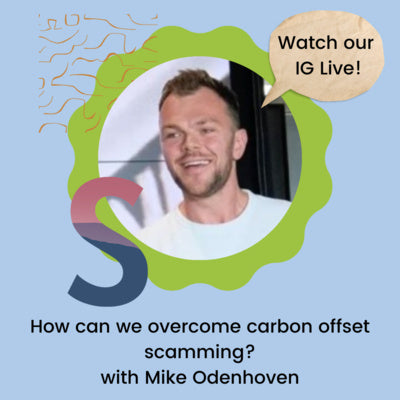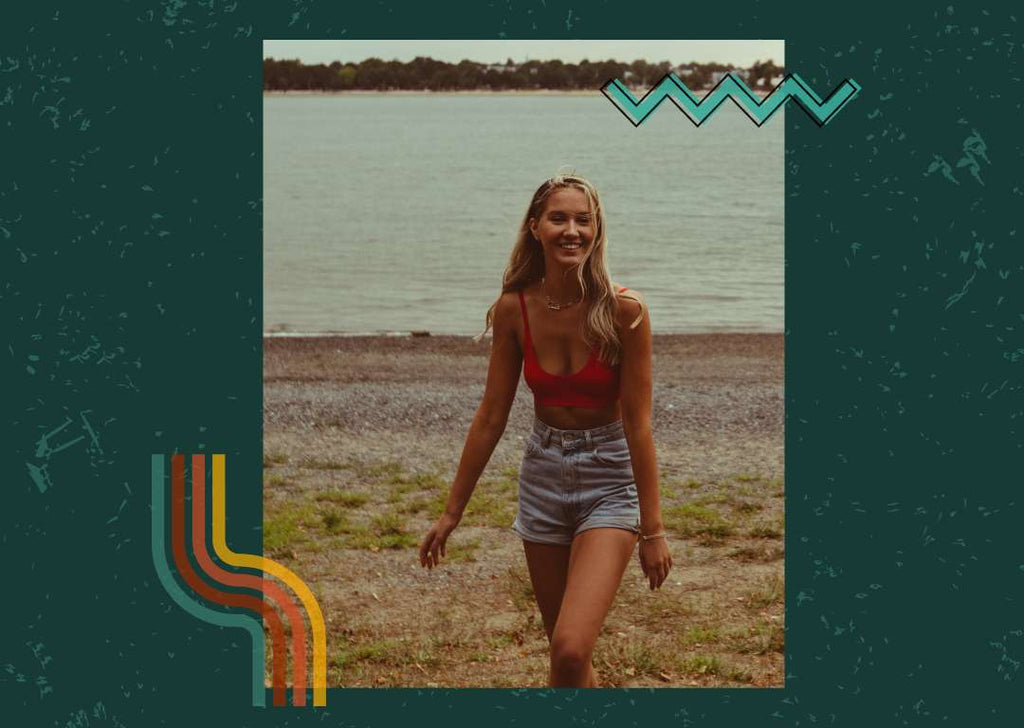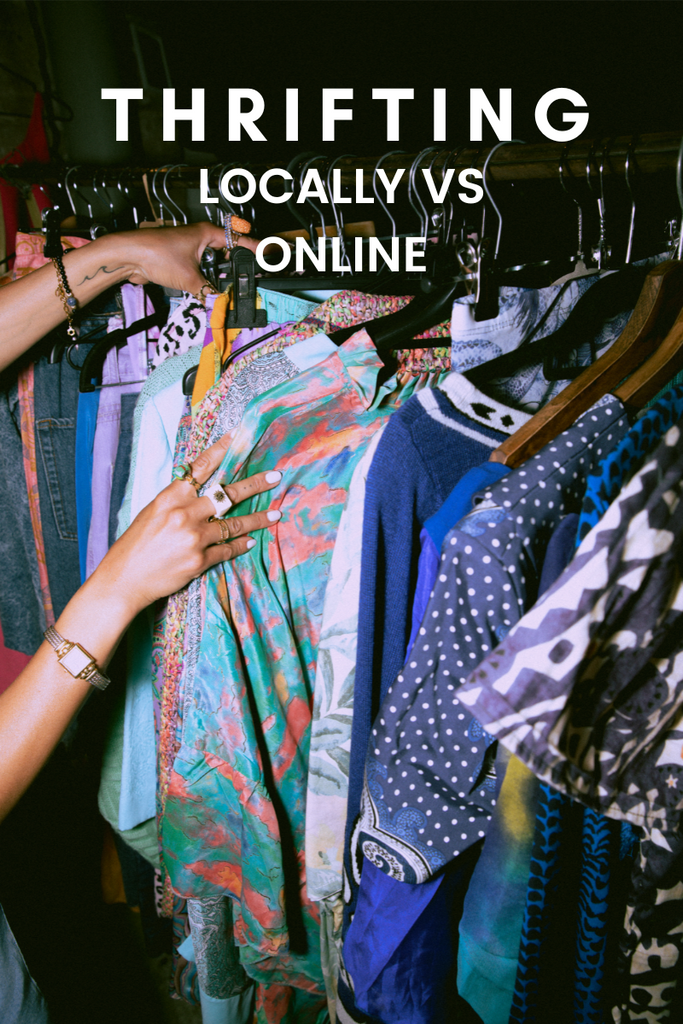Episode transcript
Alexa (BOAS):
Hello to the BOAS family! My name is Alexa Smith and I am currently a marketing intern for BOAS, I've been the host of this Instagram live series where we've talked to thought leaders, entrepreneurs, experts and activists with grand ideas of how to save lives while you live yours. And today I'm joined by Mike Odenhoven, the founder and CEO of Sumting, which is a result-based platform for nature restoration. He also has a rich history of consulting with Deloitte, research with Phillips and two master's degrees. So to get to know you a little bit beyond all of these accolades and experiences, I'll turn it over to you, Mike, to kind of introduce yourself and let us know how you got connected with BOAS.
Mike:
Awesome. Thank you. So my background is, as you mentioned - two masters. So I did a study in design and a study in business administration and that is kind of my sweet spot, in the interface between design and business. And then I started to work at Deloitte digital and basically in the venturing and innovation capability, building start-ups for the client below it so the large companies of this world. And that was mostly building digital platforms, so I really learned at Deloitte, working with all the wonderful people there, how to do this and also kind of witnessed what the power of digital platforms can be, you know, like linking supply and demand and in creating kind of meaningful links between those things. And so I built up this skill, I built up my network and then I thought, OK, now I want to use that knowledge and power for something higher than just turning a profit and kind of address what I believe is, and I think you believe the same, is the challenge of our generation to restore nature of our planet and by doing so fighting climate change. So that's when I started Sumting. I assembled a group of friends that wanted to come along for the adventure and that could do things that I can't, like building around and multidisciplinarity. And I’ve been on the adventure ever since.
Alexa (BOAS):
Awesome, that's a really beautiful story and I always enjoy hearing how environmentalists come into the work that they do, it's really interesting to hear. One thing that I am personally curious about is the meaning behind the name "Sumting" is.
Mike:
Well, it starts from this feeling that I have and that a lot of people with me have, that we wanted to do something for nature, you know, to really make a difference more than just giving money and then you don't see the results. So that's really important. But in addition, we believe that with a digital platform we can kind of mobilize the masses so everyone can join in, everyone can do something, and then the sum of all those things will move mountains. And then we take some inspiration from nature there, so we see that the forces of change, you know, like rivers from raindrops, dunes from grains of sand, the forces of change are created by many small things coming together. So that's really the spirit in which we created the business and which we are still building today.
Alexa (BOAS):
Awesome. I personally just graduated with a degree in environmental science and I'm pretty engrossed in the sustainability space. And I know that that's kind of a major topic of conversation whether individual action or more systemic change is really the answer to a lot of our environmental problems. So I'd like to hear a little bit more of your philosophy on that.
Mike:
Yeah, well, I think both. So one can stimulate the other thing, at least me and a lot of our customers, they feel kind of, well, they want to do something literally, all right, they want to give, to take action. And I think if we mobilize a big group of people, if we created this global movement of nature restoration, then soon enough, we can create systemic change by talking to governments, talking to the United Nations and the largest foundations in this space as well. So I think in time we can get there, but it starts with just you and me today. We can already take action and then gradually we build the movement.
Alexa (BOAS):
Right, and kind of with respect to the movement that's already going on, there are so many countless initiatives from governmental action to corporations making commitments related to nature restoration. But one kind of flaw that I've noticed and I'm assuming that something is also noticed is the lack of transparency and tracking when it comes to these things. So why is transparency so important for environmental actions?
Mike:
So that's really like the sweet spot. So we did a lot of research there to dive deeper into this. And what we see is that people want to take action, people want to do something, but it's really important to see the results of your contribution. Otherwise it just sort of disappears and you never really know what happened. You've given some money and then you get a thank you note in your email and that's it. And then what happens? Did that money go into someone's pocket or did it actually, I don't know, plant a tree or take some plastic out of the ocean? So that feeling that you can actually see what your money does and what difference you are making, that's what we're building this business for. And what you see is that what we hear from our customers as well is that it's very rewarding to get that feedback. So to see actually the results and people understand that it takes a bit of time and it doesn't happen instantly. If you buy a tree today, it can't go into the ground a second later because someone has to actually go and do that. And people understand that and it contributes to the fact that they believe this thing is actually happening. And then, in addition, I have to get a bit technical, but if you look at some of the initiatives that are out there and that are claiming that they are removing carbon from the atmosphere, but then if you take a closer look, it doesn't actually remove any carbon from the atmosphere, but it avoids the emission of carbon in the future. And so I think, and a lot of people with me that, humanity up until now has created a bit of a mess with carbon in the atmosphere, plastic in the ocean, deserts expanding quite rapidly and biodiversity shrinking. It's not enough to just avoid further deterioration. We need to also clean up and reverse the path that we've been on for the last couple of years. But it's really cool to see that everywhere initiatives start popping up, also like your initiative at BOAS is super inspiring to see and I think together we can really go after this problem, make it more transparent, more rewarding and more universal to contribute to nature restoration.
Alexa (BOAS):
Totally. I was wondering if you could elaborate a little bit more on kind of the current carbon offsetting space and which solutions for fighting climate change, desertification, pollution, or other kinds of environmental initiatives you find to be the most compelling, that's kind of in line with the work that Sumting does?
Mike:
Yeah, let me answer the second question first. We are super proud of the partners that we are already working with and what they have in common is a high level of integrity, so to say. So they really do what they say they do and that's a fit with us because we need the feedback to provide to our customers to show the trees that have actually been planted or the plastic that has been taken out of the ocean. What they have in common is that they are open to this sort of mix of technology and people. So it's not just technology. We use technology to create the feedback loop, but there's also this human side. So we have a lot of good conversations with them and really start to think about how we can help them more. And so we are really just at the start of our partnerships with them. And in the future, as we build our platform and infrastructure, I'm very excited about the things that we could be doing as well as employing emerging technologies, and some third parties that we can bring to these partners because we are a global platform. If everyone has to do that on their own, it's probably not feasible because of the cost and also the technical skills that are needed, but because we operate across the borders, we can start to do that. So that's really exciting.
Alexa (BOAS):
Definitely. I was wondering if you have kind of a clear set of criteria that you use to vet potential partners that are actually executing this on the grounds, boots-on-the-ground work. And if you have any memorable conversations that come to mind with partnerships that you made early on in your journey.
Mike:
So we have a number of criteria that we select partners with. And let me highlight the three most important ones. So the first I think is permanence. So we want to make sure that, for example, if a tree is planted, that it has a good chance of survival, right? So you can throw a seed into a field and say a tree has been planted but the chance that that seed matures and actually becomes a tree that can store carbon and perhaps even more important becomes a part of a forest that can sustain itself, that's key. Otherwise, if you're just planting the same kind of trees, it won't mature, it won't be a permanent store of carbon. So we don't look for temporary fixes. We look for structural fixes. That's the first one. The second criterion has to do with additionality. So we want to be sure that if we work with partners that once we put an order in for X amount of plastic or Y amount of soil revitalized that would not have happened without our support. We want to make sure that we're not just giving money but then otherwise that would have happened as well. We have contracts that cover that. And then the third one which I mentioned already is the integrity part. So on our side, the partners split out their prices. So what money is used for which causes. Are they paying good salaries to the people that are doing the work on the ground? How much is the material cost? How much are the permits to make sure that the land can be sustained? So that's really the third one. And then the last, it goes a bit without saying, but of course, our level of feedback so that we get a picture, geo stamp picture for each unit that is created. That is also something that is non-negotiable. If they don’t want to work with us that way, then it's not a fit for us. But fortunately, most partners are very open to this way of working, because they see the problem or the challenge, and they also want to show people as much as possible the work that they are doing. And so that's where we come in and have a nice kind of symbiosis. They do the work on the floor or on the ground and we create a digital layer in the clouds that creates the connection. So it's a nice collaboration.
Alexa (BOAS):
That's wonderful to hear that there is a lot of enthusiasm for organizations and partners that are willing to actually execute some of this work as well. Have you noticed that there are any particular areas or divisions of nature restoration that have been the most successful so far?
Mike:
At Sumting we define four areas, one is taking carbon out of the atmosphere and a very logical way to do that is planting trees. The second one is taking plastic out of the ocean or out of rivers. The third one is fighting desertification; revitalizing soil that can't bear it to host any nature biodiversity. And then the fourth one is restoring the wildlife; planting coral reefs, these kinds of things. And so what I see is that some people, some customers have a really like personal passion, so, for example, people that like scuba diving or like diving, they will gravitate towards these ocean-based solutions, the coral reefs or the plastic. But more generally speaking, at the moment, it's still very much about carbon. That's kind of the hot topic that everyone's talking about. Everyone wants to be carbon neutral at least. But what we're saying is the challenge is bigger than just being carbon neutral. OK, you're a good citizen, you're compliant for the last year. But we also have this challenge to clean up all the mess that humanity has made basically since the Industrial Revolution and increasingly you see people that want to contribute to that as well. So to give a short answer, a lot of people are still focused on carbon and trees but working with us they can start to see that the challenge is bigger and that they can also make nice contributions there.
Alexa (BOAS):
Awesome! Could you talk a little bit about your collaboration with BOAS?
Mike:
BOAS has this very inspiring mission to be an e-commerce platform or a webshop, but then to kind of flow all the profits back into good causes, to charities. And that is slightly broader than nature restoration. There are other very important topics to be addressed but our partnership focuses on the nature restoration side. So where we started with you and with the team is to offset your CO2 emissions for the last quarter and that will be an ongoing thing every quarter. We have contact with Vincent to ensure that trees get planted and matured and to ensure your carbon is taken out of the atmosphere. But we don't stop there. The cool thing about BOAS is that customers can decide on which charity to support, and which global goal to support. That's where in the future we can build this integration because we have the digital platform on our side so that people that contribute to nature restoration via their BOAS purchase will also get feedback about you to know what happened with their money. Essentially what I was talking about earlier is that you don't just give money and you don't see anything back, we will provide this one-to-one feedback to the customers for example for the tree that was planted or the piece of soil that was revitalized. That will become this digital integration that makes it hopefully very transparent for the customers to see what they are contributing to with their purchase.
Alexa (BOAS):
Definitely, from my perspective, our values are completely aligned. At the end of BOAS, we're very passionate about transparency and on our website, you'll find releases of our expenses and our carbon footprint. So we're definitely on the same wave there and I'm really glad that we're able to partner together.
One kind of final question that I was curious about was what do you see as the future of Sumting and what are the next steps for you?
Mike:
So the future of Sumting is very exciting and has to do with all the possibilities that these digital platforms, and digital integration layers can provide. What we are already seeing is that we have our own channels now, team, our webshop, we have our subscriptions, we allow businesses like BOAS to offset their impact and then have a nice page also on our website. But that's all in our court. The really cool stuff starts to happen when we move outside of our channels and into the channels of partners that we work with. Like the example, I just gave with BOAS. But there could be hundreds of those kinds of cases and we have a lot of cool ideas about that so you could see into your loyalty apps, whether it's with travel or with sports or whatever vertical that you're in. The checkouts, like in the BOAS case or could be the same if you book a hotel night somewhere. It could even be event-based so every time X happens we plant a tree. Every time Y happens we take some plastic out of the ocean. And that could be businesses that contribute to it in that way creating this very easy-to-enter-into partnership because the growth comes from each transaction. It's not a one-off upfront transaction but it actually scales as our partner's scale. That is one really interesting element and then the other thing is the power of technology. There are so many cool start-ups out there that are doing really inspiring things with satellite imagery, drone footage, internet-connected sensors, or time-lapse cameras, these kinds of things. And that is really where we see major investment coming in in the future to make it even more transparent, and even more rewarding to contribute to nature restoration.
Alexa (BOAS):
That is incredibly exciting! I cannot wait to follow along on your journey! Is there anything else you'd like to share with the BOAS community? Anything else on your mind that you'd like to talk about?
Mike:
I want to thank you for your time. I think this was a very lovely conversation and we should do this more often! Overall, I think if there are people out there that want to help in this challenge, the challenge to restore nature, then obviously this is a reach out to you. So if you have a start-up that is working on these things, either in emerging tech or you're planting trees, taking plastic out of the ocean, definitely reach out. If you have a business and you want to contribute to this challenge, then also reach out and we can help you and set up a very nice program for you. And finally, even if you're just a person like you and me, you can literally contribute today with just something as simple as planting a tree. It's just some of the things that count. So even if we all do something very little by ourselves, together we can move mountains.
BOAS' Blog
Newsletter
We strive to inspire with our emails, so we don't send many and they're meant to make you buy less and buy better, so no sales emails.



















